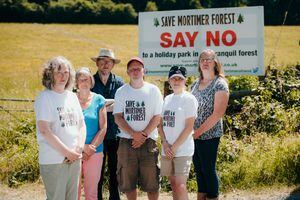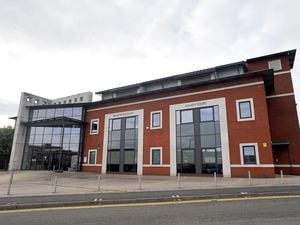'They’re vital for people': Bishop's message about our under-threat forests
Last year, plans for a holiday village in the Mortimer Forest were rejected, and the campaign against it has attracted the attention of the former Bishop of Liverpool.

When plans were thrown out for a new holiday village in the heart of a south Shropshire forest last year, it was considered a major victory for campaigners.
The 1,029-hectare Mortimer Forest, near Ludlow, was to be the site of 68 cabins for visitors to the area.
But local campaigners were furious. And while the action group which was put in place to oppose those plans is no more – it’s not needed now the plans have been thrown out – their wider point about the importance of forests is one that continues to be important.
Still, they have some support from people with friends in high places.
“We need the woodlands to help us in a different battle, this time against the changing climate and against the threats to biodiversity,” says James Jones, the former Bishop of Liverpool, as he addresses a celebration of forests in Ludlow.
Speaking at the celebration of forests event at St Laurence’s Church, he recognises the importance of trees and of woodlands – “the blood and the lungs of the earth”, he calls them.

“In the preface to the Forestry Panel’s Report I wrote, ‘Our forests and woodlands are nature’s playground for the adventurous, museum for the curious, hospital for the stressed, cathedral for the spiritual and a livelihood for the entrepreneur’.
“In short, they’re vital for people, for nature and for the economy. But therein lies the challenge of how you balance all these different interests,” says the assistant bishop in the Diocese of York.
“When I chaired the panel the big surprise for me was to discover that forests are the nation’s biggest provider of recreation. But I then became aware immediately of the tensions that often exist between the needs of competing users.”
The plans for Mortimer Forest would have seen the land handed over to Forest Holidays on a 125-year lease, earning the Forestry Commission an annual rent of £200,000.
As well as the cabins, the plans included car parking, play equipment, toilets and a new landscaped viewpoint at High Vinnalls.
The commission claimed the project would create 43 full-time equivalent jobs, plus another 47 for the local economy as a result of a predicted tourism boost of £2.4 million per year.
But campaigners from the Save Mortimer Forest group called the plans “hugely destructive” and a petition urging Herefordshire Council – on whose side of the border the development lay – to reject the application was signed by almost 5,000 people.
Now, with the plans abandoned, the Commission says it has embarked on a 50-year plan to make the forest a haven for people, nature and the economy.
“Once upon a time in this country it was said that there were so many trees you could traverse England without your foot ever having to touch the ground,” he adds. “It’s one of the reasons that other countries resent us lecturing them about deforestation when they see that we have allowed our own woodland cover to be reduced to less than 10 per cent.
“As a nation we have a long way to go to match our European neighbours who have 30 to 40 percent of their land covered by forests. A forestry panel recommended increasing woodland cover in England to 15 per cent by 2060.
“Trees are not to be left in aspic. They live and grow and die and seed their successors. Forests are best when they are managed, when the human family as part of creation works with nature to sustain the landscape. But it must be a partnership.
“Wood is the most wonderful natural and renewable resource. At a time when we are realising the danger to the environment of the excessive use of plastic it is time for the woodland industries and the scientists and the Government to work together to invest in trees and develop a more sustainable wood-based alternative.”
Before giving a speech at the church Bishop James planted a tree in the Mortimer Forest.
He then told the congregation: “Here in the Mortimer Forest I am preaching to the converted. You know the beauty of trees. You know how they cluster and grow, how they commune with each other through their roots in the earth
.”





